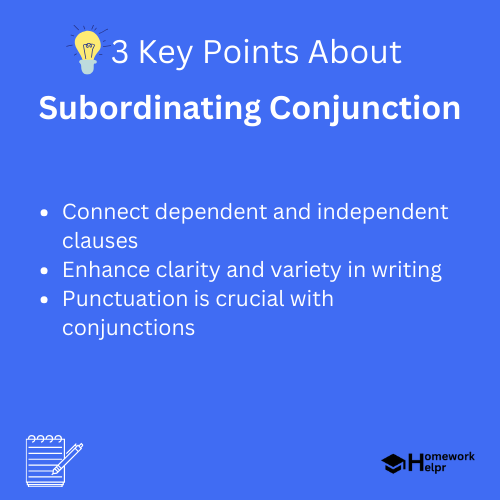📝 Summary
Subordinating conjunctions are vital in English, connecting a dependent clause to an independent clause, thus establishing relationships of time, cause, contrast, condition, or purpose. They facilitate the creation of complex sentences, enhancing clarity, flow, and variety in writing. Proper use of punctuation is also crucial, as it helps maintain clarity. Understanding and effectively employing subordinating conjunctions can significantly improve writing skills and make it more engaging and sophisticated. In summary, they play a fundamental role in refining how we express thoughts and ideas.
- Understanding Subordinating Conjunctions
- What Are Subordinating Conjunctions?
- The Role of Subordinating Conjunctions
- Types of Subordinating Conjunctions
- Examples of Subordinating Conjunctions in Use
- Punctuation with Subordinating Conjunctions
- Why Are Subordinating Conjunctions Important?
- Common Errors with Subordinating Conjunctions
- Conclusion
- Related Questions on Subordinating Conjunction
Understanding Subordinating Conjunctions
Language is a beautiful tool that enables us to express thoughts, emotions, and ideas. One of the essential components of language, particularly in English, is the subordinating conjunction. This article will explore what subordinating conjunctions are, their roles in sentence structure, examples, and the significance of using them effectively.
What Are Subordinating Conjunctions?
Subordinating conjunctions are words that connect a dependent clause to an independent clause. They create a relationship between the two clauses, indicating how one clause relates to the other. This relationship could be one of time, cause, contrast, condition, or purpose.
Some common subordinating conjunctions include:
- Although
- Because
- Since
- While
- Unless
Definition
Dependent Clause: A clause that cannot stand alone as a complete sentence and depends on the main clause for its meaning. Independent Clause: A clause that can stand alone as a complete sentence, containing a subject and a verb.
The Role of Subordinating Conjunctions
The primary role of subordinating conjunctions is to connect different clauses to form complex sentences. This connection adds depth and clarity to writing. Without them, sentences may become disjointed. For example, instead of saying, “It was raining. We stayed indoors,” one could say, “Since it was raining, we stayed indoors.”
Examples
For instance: – ‚ÄúAlthough he was tired, he continued to work.” – ‚ÄúShe went to bed early because she had an exam in the morning.”
Types of Subordinating Conjunctions
Subordinating conjunctions can be grouped based on the relationship they show between the clauses. Here are the main types:
- Time: When, While, After, Before, Since
- Cause or Reason: Because, Since, As
- Condition: If, Unless, Provided that
- Contrast: Although, Though, Even though
By understanding these types, students can effectively utilize subordinating conjunctions to enhance their writing skills.
Examples of Subordinating Conjunctions in Use
To grasp the concept of subordinating conjunctions, let‚’ look at a few examples:
- Time: “I will call you after I finish my homework.”
- Cause: “She is studying hard because she wants to pass the exam.”
- Condition: “You can have dessert if you finish your dinner.”
- Contrast: “Although he was late, he still managed to catch the bus.”
❓Did You Know?
Did you know that subordinating conjunctions not only connect clauses but also help in making your writing sound more formal?
Punctuation with Subordinating Conjunctions
Punctuation is crucial when using subordinating conjunctions. If the subordinating clause comes at the beginning of the sentence, a comma should be used before the main clause. For example:
‚ÄúAlthough it was snowing, we decided to go for a walk.”
However, if the main clause comes first, no comma is necessary:
‚ÄúWe decided to go for a walk although it was snowing.”
Definition
Punctuation: The use of symbols like commas and periods in writing that helps clarify meaning and separate elements in a sentence.
Why Are Subordinating Conjunctions Important?
Subordinating conjunctions are a critical part of English grammar. They help to convey complex ideas and relationships, making sentences more interesting and engaging. Here are some reasons why they are important:
- Clarity: They reduce ambiguity by making relationships between ideas clear.
- Variety: They help to create more complex sentences, adding variety to writing.
- Flow: They improve the flow of writing by connecting related ideas smoothly.
Without subordinating conjunctions, sentences may become short, choppy, and less engaging. Using them appropriately enhances the overall quality of writing.
Common Errors with Subordinating Conjunctions
While using subordinating conjunctions, students may encounter some common errors. Here are a few to watch out for:
- Comma Misuse: Forgetting to use a comma when needed can lead to confusion.
- Sentence Fragments: Using a subordinating conjunction incorrectly may result in incomplete sentences.
- Run-on Sentences: Merging too many clauses without proper punctuation can lead to convoluted sentences.
Understanding these pitfalls helps in refining writing skills and avoiding errors that can diminish clarity.
Conclusion
In conclusion, subordinating conjunctions are essential components of the English language. They enhance the way we connect ideas and create complex sentences, providing clarity, flow, and variety to our writing. By understanding how to use them effectively, students can improve their writing skills significantly.
So, the next time you write, remember the power of subordinating conjunctions and how they can elevate your sentences!

Related Questions on Subordinating Conjunction
What are subordinating conjunctions?
Answer: They connect dependent and independent clauses.
Why are subordinating conjunctions important?
Answer: They provide clarity and enhance writing.
What happens if punctuation is misused?
Answer: It can lead to confusion and unclear sentences.
How do subordinating conjunctions improve writing?
Answer: They create complex sentences and improve flow.
